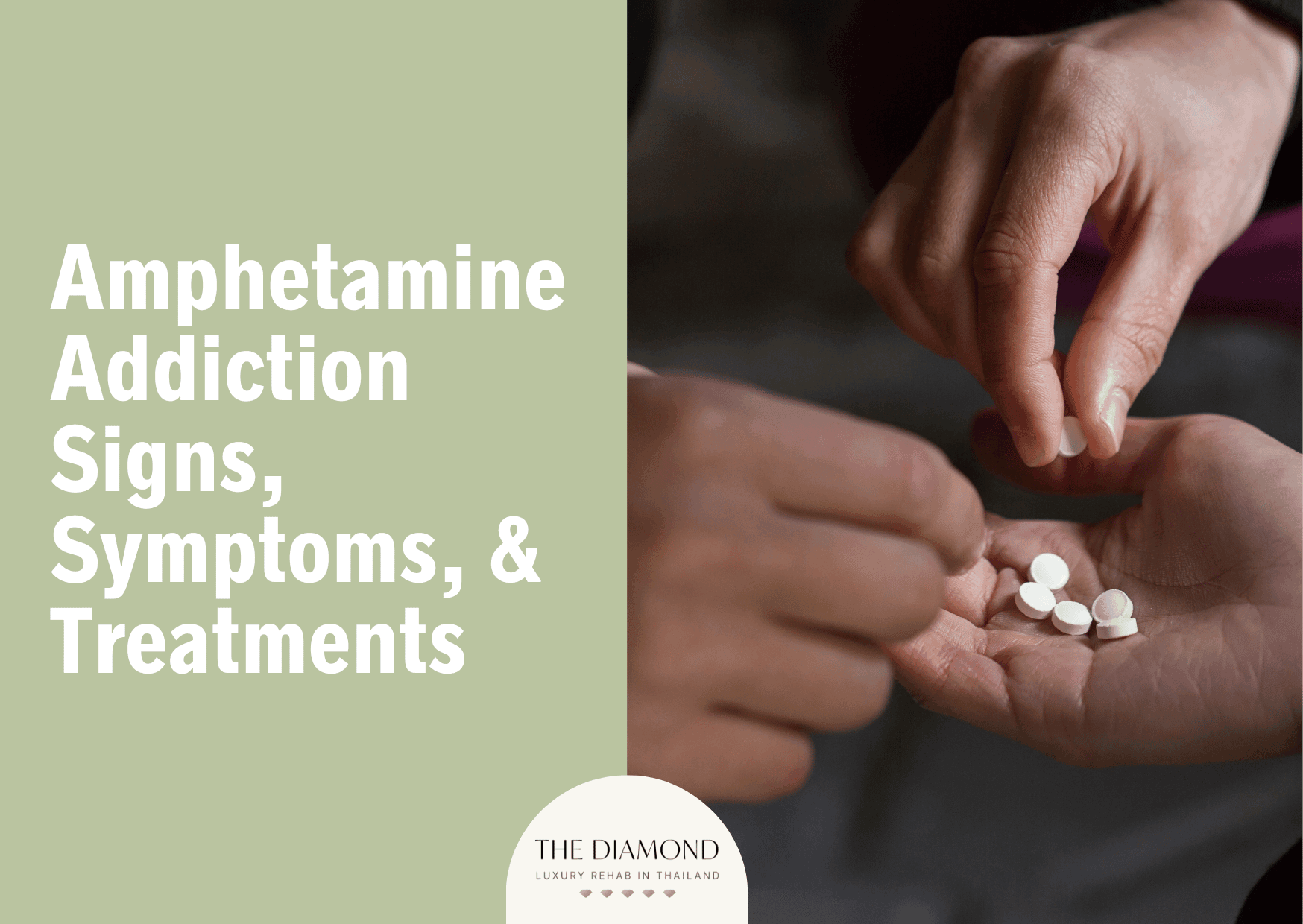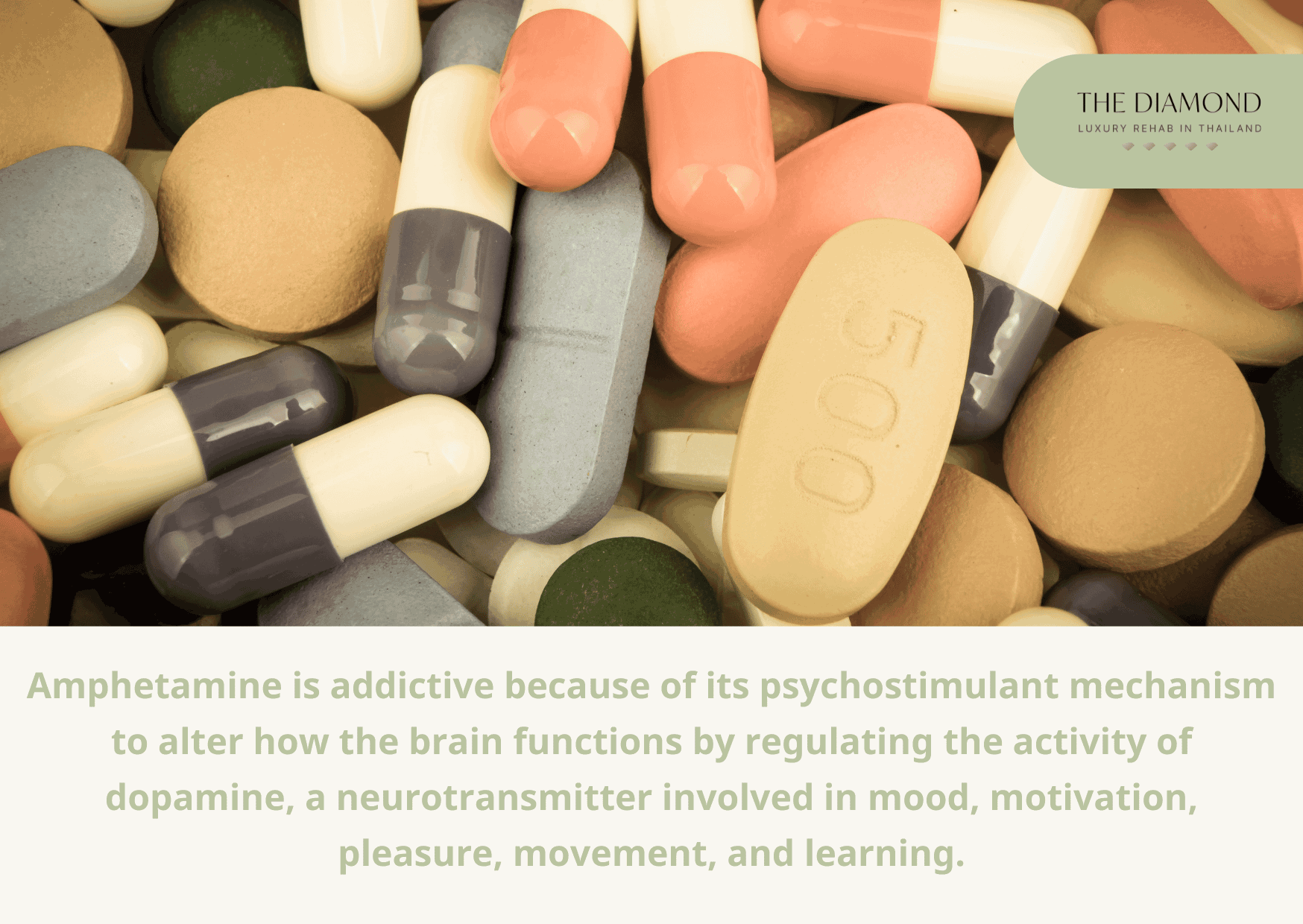Amphetamine addiction signs, symptoms, and treatments
Table of content
- What is amphetamine addiction?
- What are the causes of amphetamine addiction?
- What are the effects of amphetamine addiction?
- What are the signs and symptoms of amphetamine addiction?
- How to overcome amphetamine addiction?
- What are the risk factors for amphetamine addiction?
- How do you treat amphetamine addiction?
- What is the difference between amphetamine and methamphetamine addiction?

Amphetamine addiction is the continuous use of amphetamines despite its adverse effects on health and well-being. Otherwise known as stimulant use disorder, there are several ways of identifying the addiction.
The symptoms of amphetamine addiction include the use of amphetamines in higher doses or for longer periods, metabolic changes, insomnia, mood swings, and negative consequences on personal relationships.
The causes of amphetamine addiction are a complex interplay of different factors that affect the development of the disorder which include genetics, co-occurring mental health disorders, and the use of amphetamines with or without prescription.
The effects of prolonged amphetamine use may manifest physically and psychologically. The effects of amphetamine addiction include malnutrition, rapid heart rate, cardiovascular diseases, increased levels of aggression, and amphetamine-induced psychosis.
What is amphetamine addiction?
Amphetamine addiction refers to the development of physical and psychological dependence on any drug that belongs to the amphetamine class, such as dextroamphetamine, methamphetamine, and amphetamine.
According to a research paper published in eClinicalMedicine by a team of researchers from various institutions in Australia and New Zealand, amphetamine can induce a brief euphoria upon the use of the substance followed by a noticeable crash when the high subsides, causing unhappiness, irritability, and agitation.
What are the causes of amphetamine addiction?
The causes of amphetamine addiction are listed below.
- Biological factors: Genetic predisposition may be a factor for amphetamine addiction. Individuals with a genetic vulnerability to drug abuse are more likely to develop amphetamine addiction. A 2021 study published in Molecular Neurobiology by several researchers in the US examined the genetic profiles of patients with drug addiction problems and found that they possessed genes with an increased risk of getting addicted to drugs made from opium. This finding could suggest that genetic predisposition may be a factor for drug addiction, including amphetamine addiction.
- Psychological factors: Mental health problems are generally associated with substance abuse. One may abuse amphetamines in an attempt to cope with stress, depression, bipolar disorder, and schizophrenia.
- Social factors: Peer pressure is a significant factor in developing any type of drug addiction. According to a qualitative study published in the International Journal of Academic Research in Business and Social Sciences by a team of researchers, lecturers, and professors in Malaysia, repeated interactions with people who use drugs and exposure to drug consumption contribute to drug addiction. Addiction may also stem from the desire to fit into a social group that uses drugs.
What are the effects of amphetamine addiction?
The effects of amphetamine addiction are listed below.
- Physical effects: Amphetamine dependence has a wide array of effects on the body. The physical effects of amphetamine addiction include extreme weight loss, chest pain, skin problems, headache, nausea, tooth decay, tremors, and extreme exhaustion. These effects have a slower onset and longer duration.
- Psychological effects: Chronic amphetamine consumption inflicts terrible damage on mental and cognitive health. According to the same research paper published in eClinicalMedicine, the acute psychological effects of amphetamine addiction include hallucinations, depression, paranoia, increased aggression, and suicidality. A 2019 review article published in Frontiers in Neuroanatomy by a team of professors and researchers from the University of Pisa and IRCCS Neuromed in Italy further adds that acute amphetamine addiction can impair cognitive functions that disrupt memory, attention, and decision-making.
- Short-term effects: Amphetamines can incite immediate effects, including heightened alertness and energy, decreased fatigue, elevated moods, increased curiosity, and enhanced focus, attention, and concentration.
- Long-term effects: Prolonged abuse of amphetamines can cause a plethora of health risks. In a 2020 paper published in CNS Drugs, a team of professors from different research centers and universities in Australia highlights the comorbidities associated with long-term amphetamine consumption which includes depression, anxiety, psychosis, and cardiovascular diseases such as heart attack and stroke.
What are the signs and symptoms of amphetamine addiction?
The signs and symptoms of amphetamine addiction are listed below.
- Use of amphetamines in higher doses or for longer periods: Also called tolerance, chronic amphetamine use can make a person need higher doses of the substance to achieve the same pleasurable effect.
- Metabolic changes: Amphetamines can suppress appetite and burn calories faster than usual. Continuous abuse of substances may result in weight loss.
- Insomnia: Amphetamines tend to increase certain types of brain chemical activity. This results in bursts of energy which make it difficult for the body and mind to remain quiet, causing disruptions in sleep patterns.
- Mood swings: The main reason for the continued use of amphetamines is the temporarily elevated mood experienced immediately after taking the substance. The problem with this brief, heightened mood, however, is when the feelings of euphoria subside and the user is left feeling worse.
- A significant amount of time is spent on using the drug: As amphetamine use becomes a priority of the addicted person, a huge amount of their time will be allotted for seeking, using, and recovering from the aftereffects of the substance.
- Multiple failed attempts to cut down on amphetamine use: An amphetamine addict may need multiple serious recovery attempts before resolving the disorder. The number of attempts mainly depends on the severity of the person’s circumstances.
- Negative consequences on personal relationships: Amphetamine addiction can have serious negative effects on relationships with family and friends. Suffering from a substance abuse problem may mean skipping important family celebrations or social gatherings, resulting in strained relationships.
Other possible amphetamine addiction symptoms include:
- Failing to fulfill primary role obligations at work or school
- Experiencing withdrawal symptoms when substance use is stopped or reduced
- Using amphetamines in risky situations such as when driving a car or operating heavy machinery
How to overcome amphetamine addiction?
Amphetamine addiction can be overcome by acknowledging that the problem exists and seeking professional help for appropriate guidance in treating the disorder. Admitting that a problem with amphetamine use exists may be challenging, but it is often the first step to recovery.
Identifying that there is a problem with addiction starts with assessing the frequency and amount of amphetamine consumption. This can help a person determine when drug use is being out of control and may encourage them to work towards positive changes.
Another beneficial step is to evaluate the impact of excessive amphetamine use in life. Identifying the obvious negative consequences of substance abuse can aid in creating goals toward recovery.
What are the risk factors for amphetamine addiction?
The risk factors for amphetamine addiction that can increase the likelihood of developing stimulant use disorder are listed below.
- Easy access to amphetamines: The availability of amphetamines is a critical factor in developing an addiction. Easier access may come in the form of prescriptions. Abuse may start once an individual becomes dependent on amphetamines and increases the dose more than initially prescribed for medication
- Underlying psychiatric issues: People suffering from mental health conditions such as depression, anxiety, or bipolar disorder are at a higher risk of developing amphetamine addiction. Combining these psychiatric issues with a condition where one needs to take amphetamines can cause people to use the substances as a way of coping with negative feelings.
- Chronic stress: Stress can enhance a person’s susceptibility to amphetamine addiction. Stress can trigger brain changes similar to those produced by addictive drugs, suggesting that people under high levels of stress may be more prone to drug abuse.
How do you treat amphetamine addiction?
Treating amphetamine addiction can be done by employing psychosocial and pharmacological interventions. Treatment programs are also available to accommodate individuals struggling with amphetamine abuse. These treatment programs involve different modalities including detox, individual counseling, behavioral therapy, and peer support.
Currently, the clinically accepted initial treatment approach for amphetamine addiction is psychosocial interventions through behavioral therapies. According to a comparative study published in PLOS Medicine by distinct researchers and professors from Rome, Switzerland, the UK, and the US, among the most effective interventions for cocaine and amphetamine addiction are contingency management and community reinforcement approach. Contingency management is a behavioral intervention that associates positive reinforcements in the form of rewards and prizes to reward patients for sobriety. Meanwhile, the community reinforcement approach helps individuals find and execute rewarding activities as alternatives to drug use. This may be in the form of social, recreational, or vocational activities, and skills training and support to enhance their quality of life.
Psychological interventions such as cognitive-behavioral therapy (CBT) may also be an option for treating amphetamine addiction. CBT helps people identify and challenge their dysfunctional thoughts and beliefs related to drug use, and develop coping skills and strategies to prevent relapse.
The National Insititute on Drug Abuse further adds that a 16-week comprehensive behavioral treatment approach such as a Matrix Model may effectively manage methamphetamine and amphetamine abuse. The program involves a combination of behavioral therapy, family education, individual counseling, 12-step support, drug testing, and encouragement for non-drug-related activities.
Why is using amphetamines addictive?

Using amphetamines is addictive because they are stimulant drugs that can cause brain structural abnormalities, ultimately affecting a person’s ability to stop amphetamine use. Amphetamines are a group of synthetic drugs that affect the central nervous system (CNS).
Amphetamine is a stimulant drug that is used to prescribed to treat conditions such as attention deficit hyperactivity disorder (ADHD) and narcolepsy. It can be used occasionally to treat depression and may also aid in weight loss.
The advantages of amphetamines include the reduction of ADHD symptoms and improvement of brain development in children with the condition. When legitimately used, amphetamines may provide some benefits.
The disadvantages of excessive amphetamine use may manifest in physical and psychological ways, including malnutrition, heart problems, seizures, mood swings, increased aggression, and psychosis. For less common medical uses, however, doctors do not consider amphetamines as the first line of treatment due to concerns over their side effects. When used for recreational purposes, amphetamines have several unwanted effects.
Amphetamine is addictive because of its psychostimulant mechanism to alter how the brain functions by regulating the activity of dopamine, a neurotransmitter involved in mood, motivation, pleasure, movement, and learning. Dopamine is normally released in response to rewarding activities such as food, sex, or social interaction. The process of how the brain develops amphetamine dependence is discussed in a chapter of the book Treatment for Stimulant Use Disorders published by the Substance Abuse and Mental Health Services Administration. It was further explained that amphetamine use induces an excessive release of dopamine in the brain which results in euphoria, increased motor activity, and enhanced motivation. These effects are associated with delusions, hallucinations, and paranoia. Once the effects of excessive dopamine deplete, these effects subside which creates a cycle of addiction, as the user seeks to restore the dopamine balance and experience the same level of pleasure.
When is amphetamine addiction counseling necessary?
Amphetamine addiction counseling is necessary when the addiction has impaired important aspects of life. Counseling is necessary for identifying negative emotions associated with amphetamine abuse and developing more functional ways of looking at one’s situation.
Family involvement in counseling is also a positive approach to help educate family members about the condition and explain the challenges and needs of the patient throughout recovery.
Family therapy can also help repair relationships that may have been affected because of the addiction.
What are the symptoms of amphetamine addiction withdrawal?
The symptoms of amphetamine addiction withdrawal include depression, anxiety, crankiness, confusion, severe fatigue, nightmares, an inability to feel pleasure, and intense cravings for amphetamine.
Withdrawal symptoms occur upon cessation of amphetamine use. It’s a process where the mind and body adjust to the absence of the substance after a period of regular or heavy use. Managing withdrawal symptoms of amphetamine addiction should be administered under healthcare and professional medical supervision.
What is the difference between amphetamine and methamphetamine addiction?
The difference between amphetamine and methamphetamine addiction is that meth addiction has far more harmful and longer-lasting consequences than amphetamine abuse. Although methamphetamine is technically a type of amphetamine due to its similar chemical structure, meth is more potent than amphetamines.
Methamphetamine is more likely to be illegally consumed, has more dangerous side effects, and increases dopamine levels in the brain at a drastically greater rate compared to other stimulant drugs.

